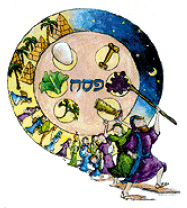 Clean out the old leaven, that you may be a new lump, just as you are unleavened.For Messiah our Passover also has been sacrificed. Let us therefore celebrate the feast, not with old leaven, nor with the leaven of malice and wickedness, but with the unleavened bread of sincerity and truth. 1Co 5:7-8
Clean out the old leaven, that you may be a new lump, just as you are unleavened.For Messiah our Passover also has been sacrificed. Let us therefore celebrate the feast, not with old leaven, nor with the leaven of malice and wickedness, but with the unleavened bread of sincerity and truth. 1Co 5:7-8
As we enter into the Season of our Redemption let us “clean out the old leaven”. Passover is God’s first “appointed time” in the Torah. It is the beginning of the spring festival cycle beginning with Passover, Feast of First Fruits, and concluding with Shavuot (Pentecost). Passover begins at “twilight” of 14 Nissan, this year, 5772, is Friday, April 6th. The Seder is celebrated the first night in Israel and both the first and second nights in the Diaspora. In order to fulfill the commandment, one may also celebrate it on any night during Passover week, which for most people, is their respective Community Seder events.
The Feast of First Fruits begins on the third day, April 9th this year, and is also the first day on which we “Count the Omer”. The Torah commands us to “Count 49 Days” from Passover ending on Day 50 which is Shavuot. We’ll have more on these two things later, but for now we’ll focus on Passover.
FIRST THINGS FIRST
The first thing we do to prepare for Passover is to thoroughly remove leaven or "Chametz" from our “dwelling”. Many communities have stricter or looser interpretations of “your dwelling” so for our purposes, we will consider this to be your home and your living space. If you need clarification please call your Rabbi or Congregational Leaders directly. In order to remove the leaven, you must know what constitutes leaven. Leaven is “yeast”. It is not leavening agents, such as baking powder or baking soda. Products with “autolyzed yeast” are NOT chametz and do not have to be removed. The first thing you need to do is change your grocery list. Stop purchasing food that contains leaven if you cannot consume it by April 6th, the day before the first day of Passover, which is the day we make the final search for leaven. The easiest part is to avoid these 5 grains in all their forms: Wheat, Oats, Barley, Rye, and Spelt. Next, read the labels. You may be surprised to find yeast as an ingredient in many canned foods, beverages, bottled sauces and condiments. In my home, the rule is “use it or lose it”. I begin as early as January to notice what I buy and begin the effort to consume anything that I otherwise will be required to toss. Rather than toss it, however, I make an annual box of it all and contribute it to my local food bank for the poor and needy.
Once you adjust your buying habits, then look at all the food and beverage stuffs in your pantry, freezer and fridge. If the label says “yeast”, it will need to go. Our community follows the Sephardic community (Israel) rules or “halacha” for what constitutes leaven. In the Ashkenazi community (Eastern European) leaven includes rice and legumes (beans), known as “kitniyot”. This is for each community to decide, but in our community we do not eliminate rice and beans.
For 7 days, the Lord tells us to eat unleavened bread. This is known as Matzah and is available in many flavors today-even chocolate covered! We eat matzah as a substitute for anything we would want bread or flour for eating or baking. It’s yummy and there are many creative ways to use it. (I have lots of recipes if anyone wants a few). Many of our local markets carry “Kosher for Passover” products which makes this very convenient.
For some, this may seem burdensome, but the Lords commandments are not burdens but blessings! It’s only a few days that we avoid leaven and a wonderful opportunity to examine, not only our pantries but, our lives for the “leaven” we can remove, such as pride, arrogance and ingratitude. The Lord has surely prepared these Festivals from before the foundation of the world for our good! So let us keep the feast!